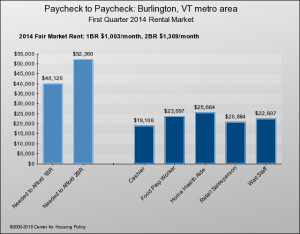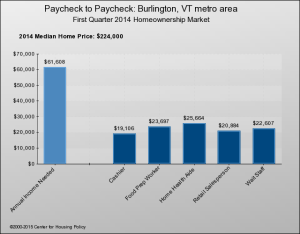Burlington needs more affordable housing, lots of it. Affordable rentals, especially. After all, renting households far outnumber owner households in this city, and by any measure, they’re financially stressed. On average, according to a city report last year, Burlington’s renters pay 44 percent of their income on housing. More than one-third of Burlington’s renters pay more than half their income on housing. That’s what’s known among housing specialists as a severe burden.
Because of inclusionary zoning, we can be fairly confident that new, affordable rental units will be made available wherever big new developments go in. The hope here, at the Fair Housing Project, is that such developments be spread around the city. Not all the new affordable units have to go in the Old North End!
The South End would seem to be prime candidate for more subsidized, multi-family housing, and as far as we’re concerned, the Hill should be another possibility. Granted, there’s a trade-off between the price of land and the number of units that can be developed on a given tract; but still, we support the idea of locating a decent share of new affordable housing in low-poverty areas.
Here’s an interesting perspective on Burlington’s unaffordability from the point of view of low-wage workers. Consider five occupational categories that lead the state in numbers of workers: cashiers, personal care aids, retail salespeople, food prep workers and wait staff. Look at this graphic (courtesy of the National Housing Conference’s “Paycheck to Paycheck” that shows what annual income is needed to rent an apartment in Burlington without being burdened; and how their incomes compare:
Incidentally, personal care aide is one of the state’s fastest growing occupations. That’s a testament to the greying of Vermont, because personal care aides assist elderly or disabled adults. Is it too much to ask that personal care aides be able to find affordable housing in the same communities where they serve their clients?
What about home ownership in Burlington for these workers? Similarly out of reach:

